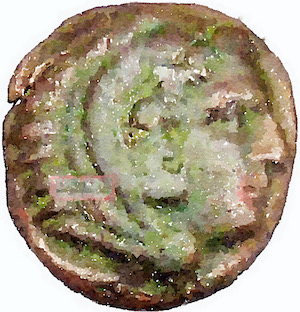
Cassander (c.354-c.297 BCE), son of the Macedonian statesman and general Antipater, and contemporary of Alexander the Great, was the de facto ruler of Macedonia and southern Greece from 318 BCE.
His family were distant relatives of Macedonia's ruling dynasty, and he became king of Macedonia in 305. Cassander cleared his path to the throne by arranging the deaths, among others, of Alexander the Great's mother (Olympias), wife (Roxana) and her children.
In his youth, alongside Alexander, Hephaestion, Ptolemy and Lysimachus, he was one of the pupils at Aristotle's Macedonian Lyceum.
He arrived at Alexander's court in Babylon in 323, most likely sent on a mission to uphold his father's regency in Macedon. However, a later contemporary hostile to the Antipater's family suggested that Cassander travelled to the court to poison Alexander.
In any case, Alexander treated him with naked hostility, and Cassander subsequently stood out amongst the Diadochi ("Successors") in his hostility to Alexander's memory. As ruler of Macedon, he promoted the memory of Philip II over that of Alexander. His decision to restore Thebes, which Alexander had destroyed, was perceived at the time to be a direct snub to the deceased ruler.
Cassander's rise to prominence began when he was appointed chiliarch (cavalry commander and grand vizier) at Triparadeisus, late in 321. He initially continued in the position after his father died in the autumn of 319 and passed the regency of Macedon to Polyperchon. While Antipater may have sought to avoid alarming the other Diadochi by seeming to establish a new ruling dynasty, the decision may also have been prompted by knowledge of Cassander's ambitions.
In any case, Cassander soon rejected the decision, allying himself with Antigonus, Ptolemy and Lysimachus against Polyperchon and Olympias and establishing bases in Piraeus and the Peloponnese.
After destroying Polyperchon's fleet, Cassander placed Athens under the control of Demetrius of Phaleron, declared himself regent and made an inconclusive move into Macedonia.
A more successful second attempt after Olympias ousted Alexander's half brother Philip Arrhidaeus was more successful. He tjhen besieged Olympias in Pydna. She when the city fell two years later, despite an alleged guarantee to spare her life. He then confined Alexander's wife and son at Amphipolis and had them killed in 310 or 309.
Cassander removed the last obstacle to his ambitions after Polyperchon began to tout Alexander's alleged illegitimate son Heracles as the true heir to the Macedonian inheritance in 309. He bribed Polypercjon to have the boy killed.
With his position in Greece and Macedonia reasonably secure, Cassander proclaimed himself king in 305.
After his last rival, Antigonus, died in the battle of Ipsus (301), Cassander was finally the undisputed master of Macedonia, but he had little time to savour the achievement. He died of dropsy four years later.
In the meantime, he had ceremonially refounded Thebes in 316 and played a leading role in the coalition against his former ally Antigonus (315–311). The 311 'Peace of the Dynasts'recognised his position in Europe. He strengthened his dynastic ambitions by marrying Alexander's half-sister, Thessalonica and subsequently named the city he established on the former site of Therma after her.
While Thessalonika is now the second-largest city in Greece, Cassandreia, founded on the ruins of Potidaea, was a less successful enterprise.
While Cassander restored peace and prosperity to Macedonia, quarrels among his heirs meant his dynasty did not last much beyond his death. One son (Philip) died of natural causes, while his other sons (Alexander and Antipater) became involved in a fierce dynastic struggle. That left the way clear for Demetrius I to oust Antipater, killed Alexander and establish the Antigonid dynasty.
Sources:
Chambers Biographical Dictionary
Oxford Dictionary of the Classical World